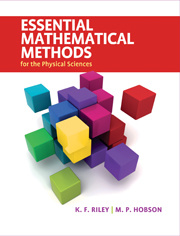Essential Mathematical Methods for the Physical Sciences
Langue : Anglais
Auteurs : Riley K. F., Hobson M. P.

The mathematical methods that physical scientists need for solving problems are clearly set out in this tutorial-style textbook.
The mathematical methods that physical scientists need for solving substantial problems in their fields of study are set out clearly and simply in this tutorial-style textbook. Students will develop problem-solving skills through hundreds of worked examples, self-test questions and homework problems. Each chapter concludes with a summary of the main procedures and results and all assumed prior knowledge is summarized in one of the appendices. Over 300 worked examples show how to use the techniques and around 100 self-test questions in the footnotes act as checkpoints to build student confidence. Nearly 400 end-of-chapter problems combine ideas from the chapter to reinforce the concepts. Hints and outline answers to the odd-numbered problems are given at the end of each chapter, with fully-worked solutions to these problems given in the accompanying Student Solutions Manual. Fully-worked solutions to all problems, password-protected for instructors, are available at www.cambridge.org/essential.
1. Matrices and vector spaces; 2. Vector calculus; 3. Line, surface and volume integrals; 4. Fourier series; 5. Integral transforms; 6. Higher-order ODEs; 7. Series solutions of ODEs; 8. Eigenfunction methods; 9. Special functions; 10. Partial differential equations; 11. Solution methods for PDEs; 12. Calculus of variations; 13. Integral equations; 14. Complex variables; 15. Applications of complex variables; 16. Probability; 17. Statistics; Appendices; Index.
K. F. Riley read mathematics at the University of Cambridge and proceeded to a Ph.D. there in theoretical and experimental nuclear physics. He became a Research Associate in elementary particle physics at Brookhaven, and then, having taken up a lectureship at the Cavendish Laboratory, Cambridge, continued this research at the Rutherford Laboratory and Stanford; in particular he was involved in the experimental discovery of a number of the early baryonic resonances. As well as having been Senior Tutor at Clare College, where he has taught physics and mathematics for over 40 years, he has served on many committees concerned with the teaching and examining of these subjects at all levels of tertiary and undergraduate education. He is also one of the authors of 200 Puzzling Physics Problems.
M. P. Hobson read natural sciences at the University of Cambridge, specialising in theoretical physics, and remained at the Cavendish Laboratory to complete a Ph.D. in the physics of star-formation. As a Research Fellow at Trinity Hall, Cambridge, and subsequently an Advanced Fellow of the Particle Physics and Astronomy Research Council, he developed an interest in cosmology, and in particular in the study of fluctuations in the cosmic microwave background. He was involved in the first detection of these fluctuations using a ground-based interferometer. Currently a University Reader at the Cavendish Laboratory, his research interests include both theoretical and observational aspects of cosmology, and he is the principal author of General Relativity: An Introduction for Physicists. He is also a Director of Studies in Natural Sciences at Trinity Hall and enjoys an active role in the teaching of undergraduate physics and mathematics.
M. P. Hobson read natural sciences at the University of Cambridge, specialising in theoretical physics, and remained at the Cavendish Laboratory to complete a Ph.D. in the physics of star-formation. As a Research Fellow at Trinity Hall, Cambridge, and subsequently an Advanced Fellow of the Particle Physics and Astronomy Research Council, he developed an interest in cosmology, and in particular in the study of fluctuations in the cosmic microwave background. He was involved in the first detection of these fluctuations using a ground-based interferometer. Currently a University Reader at the Cavendish Laboratory, his research interests include both theoretical and observational aspects of cosmology, and he is the principal author of General Relativity: An Introduction for Physicists. He is also a Director of Studies in Natural Sciences at Trinity Hall and enjoys an active role in the teaching of undergraduate physics and mathematics.
Date de parution : 02-2011
Ouvrage de 843 p.
19.8x25.3 cm
Disponible chez l'éditeur (délai d'approvisionnement : 14 jours).
Prix indicatif 68,67 €
Ajouter au panierThème d’Essential Mathematical Methods for the Physical Sciences :
© 2024 LAVOISIER S.A.S.
